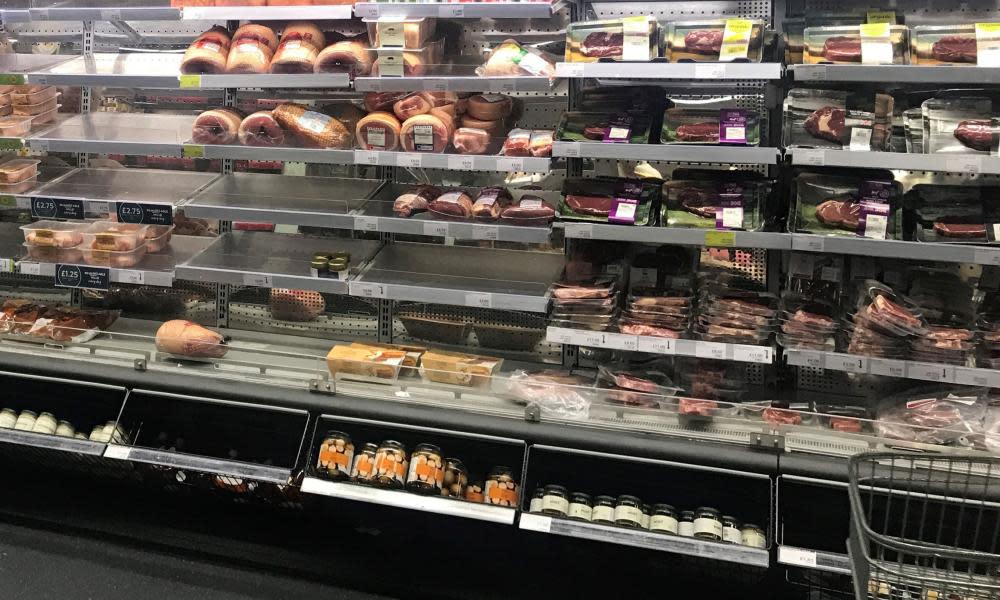M&S warns against separate post-Brexit labelling for goods sold in Northern Ireland

Marks & Spencer has urged the UK government not to consider separate labelling for goods sold in Northern Ireland during talks with the EU about improving post-Brexit trade arrangements, arguing that it would be too costly for retailers and customers.
The retailer’s chair, Archie Norman, has written to the foreign secretary, James Cleverly, arguing the requirement would not be a useful change to the Northern Ireland protocol and would create “overbearing and prohibitive costs” for exporters.
The intervention comes as talks are continuing between the UK and the EU over possible changes to the controversial post-Brexit protocol to make it operate better, after unionist anger over its checks on trade between Great Britain and Northern Ireland led to violence and the suspension of the Stormont assembly.
Both sides have previously suggested that additional labelling could help to reduce the need for checks on goods and import controls.
M&S, which has operated in Northern Ireland for more than 50 years, is cautioning that additional labelling would be costly, and would therefore reduce availability and choice for customers in Northern Ireland and lead to higher prices at a time of high food inflation.
Norman says in the letter: “There are two variants to the labelling proposals, either Northern Ireland-specific labels or UK-wide labels. Both incur the same problem for those retailers or manufacturers operating in both Northern Ireland and Ireland.”
The food and homeware retailer said it sent between 7% and 9% of its sales to Northern Ireland. It warned that specific labelling of products to be sold there would require “specific production runs and segregated stock”, adding this would add extra cost for “packaging changes on every production run”, which would be particularly challenging for small suppliers.
In addition, the retailer wrote that UK-only labelling of all products subject to sanitary and phytosanitary checks – for products of animal or plant origin, including meat and fish – would be “an even worse outcome for M&S”.
This would require goods being exported to the Republic of Ireland or elsewhere to have “separate production runs, packaging and segregated stock”, Norman said, adding this would “completely undermine the ‘all Ireland supply’ we have set up to help get around the current issues”.
It is understood that the UK has not ruled out the possible use of labelling of products.
Norman’s letter, first reported by the BBC, instead suggests that the EU and UK consider “digital tracing” of goods, which he described as “a far better, more modern and lower cost solution”.
He adds that this would remove the needs for physical checks and labelling of products intended for Northern Ireland, as it provides a clear view on where goods are sent, and describes this tracing as “very common in the food industry”.
Talks aimed at finding a solution to the Northern Ireland protocol reopened in September, and in a first sign of progress, agreement was reached in early January between the UK and the EU over access to a new British database providing real-time information on goods travelling from Great Britain to Northern Ireland.
Norman, a former Conservative MP, has previously backed government plans to override parts of the protocol, criticising “pointless” post-Brexit rules for sending food to the EU, given British food standards were in line with or higher than those made by Brussels.
He said last year that some food exported to the Republic of Ireland required 700 pages of customs documents, parts of which were written in Latin.
A labelling regime would “raise prices and reduce choice for consumers, further disadvantage UK farmers and suppliers and impact UK retailers competitiveness in other international markets,” Norman said.
He called it “baffling” in a digital age that “the government and EU have rewound four decades to discuss an expensive ‘solution’ involving stickers and labelling”.
The Foreign Office has been contacted for comment.

 Yahoo News
Yahoo News 
